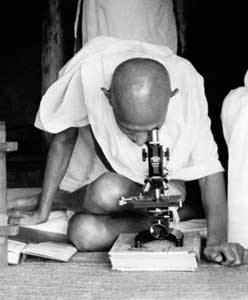Abbott protest follow-up: "In a word, yes."
 photo of Chicago protest with Thai activist Mai Rewthong speaking, from abbottsgreed.com
photo of Chicago protest with Thai activist Mai Rewthong speaking, from abbottsgreed.com
Bill Clinton recently endorsed the decision of the Thai government to issue compulsory licenses for pharmaceuticals to be used in the Thai public sector medical system. It was really during Clinton's presidency that a global shift took place about intellectual property rules. As I wrote in my thesis/book-in-progress,
A debate about [global trade rules] came into the open in 1999, while pharmaceutical companies were suing the South African government. They objected to a 1997 law that permitted compulsory licensing for generic versions of patented medicines. In the United States, the Clinton Administration backed the pharmaceutical companies’ position, threatening trade sanctions. And the companies threatened to stop selling drugs in South Africa. When a New York Times reporter asked an industry spokeswoman if that meant they were “literally threatening to let people die if the law stands”, she “hemmed a bit and then answered: ‘In a word, yes.’”
Activist groups started strategizing. In the United States, a coalition of AIDS activists–who later formed the core of a group called Health GAP–began discussing how they could influence American trade policy. In South Africa, a small group of activists, led by the HIV-positive activist Zackie Achmat, had formed the Treatment Action Campaign (TAC) in late 1998.
TAC targeted the pharmaceutical companies and the US government with protests in South Africa, raising the visibility and political risk of the companies’ lawsuit and of US trade policy. In the United States, activists targeted then-vice president Al Gore as he began a run for president. At campaign appearance after campaign appearance, ACT UP activists shouted the slogan “Gore’s Greed Kills!” linking pharmaceutical companies’ contributions to Gore’s campaign with the government’s trade policy.
Gore and the Clinton administration faced a no-win political situation in the making. They started backing away from the fight. The companies kept up their lawsuit, but the activists had isolated them.
It's important to remember this history in the current controversy over Abbott: this fight has been fought (and won) before. Abbott is trying to roll back global trade rules to 1997, at a time when it thinks no one will notice. It's really important that we keep noticing.
I promised an update from the protest. (Links to media coverage are in a post below.) Three Thai AIDS activists accompanied a group of 60-70 student protesters (along with Brook Baker, from Health GAP) to Abbott Labs' facility in Worcester, MA. As a group, we staged a die-in, some activists delivered speeches, and won only slight coverage from the media. (The Worcester media covered it, though, which is more important than it sounds: for local Abbott employees, it's important to know why people are protesting in front of their building.) More coverage came from the Chicago Tribune and others covering the shareholders' meeting the next day; for this more important coverage, the Worcester protest and its many counterparts served mainly as a backdrop to emphasize the theme of a globally-coordinated activist movement opposing this global company.
A small group of UMass medical students, whose school and hospital is right across the street, were the only other med students there. I didn't get a chance to talk to them. They had an array of style choices--scrubs, white coat over jeans, white coat+tie, and so on--reflecting that some had just come over from the hospital while others had come from classes or a day off. "I've got to get back soon," one said to another, "My guy is going to have a thoracentesis to get two liters off." "Two liters?!" After a little bit of "Drugs Cost Pennies! Greed Costs Lives!" he was off.
I got to hang out a little bit with two activists from the Thai Network of People Living with HIV and AIDS, TNP+, including its head, and a woman translating for him (pictured above, ID'ed as Mai Rewthong by abbottsgreed.com; I didn't write down either of their names, to my shame now). They were there with Jon Ungphakorn, a former Thai senator and long-time AIDS activist; the group of three were touring as many of these protest actions as they could. They were in Chicago at the shareholders' meeting the next day.
For my current work as a historian of AIDS activism, the most interesting moment was when someone shouted, "People with AIDS, under attack! What do we do?" and everyone immediately and vigorously responded, "ACT UP! Fight back!" This chant--and ACT UP itself--was invented twenty years ago, before many of the protesters were born. Everyone--Thai activists, college students, med students--felt that it somehow represented them. There are some amazing continuities in the AIDS activist movement, from gay men with AIDS in 1983 to the coalition of people with AIDS and queer activists in ACT UP in 1987 to today's student groups and global groups of people with AIDS.
On the bus back, I found out that many of the Harvard Student Global AIDS Campaign members who were coming to the protest were pre-med students, and I found myself giving pre-med advice to a small group of them during the bus ride. It is more than a little bit startling and disconcerting--but, I think, ultimately inspiring--to find that a number of Harvard pre-meds make it part of their pre-med process to get on a bus and shout "ACT UP! Fight back!" at a pharmaceutical company. Let's hope for more of that in the future. Perhaps one day, the pre-med mantra for getting ready to apply for medical school will be, "grades, MCATs, research, volunteering, going to die-ins."





No comments:
Post a Comment